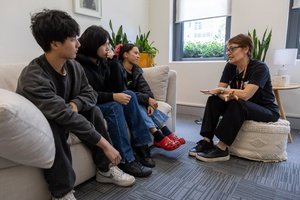A kind of grim listlessness, a suffocating lethargy permeated her waking hours. She was angry at home. Usually comforting sensory moments, like enjoying a perfect cup of coffee, were devoid of pleasure.
As a teacher with autism, Lai’s experience of burnout had reached the final stage.
“I felt like there was nothing left, and I had given everything to everybody for a long time. I couldn’t go anywhere but up, is the honest answer,” she tells EducationHQ.
“I got to the point where my body physically shut down, my brain physically shut down and I couldn’t give anything more – not only to being a teacher but to my partner and my kids, too.”
After around ten years in the school system, Lai’s autism had only intensified the challenge of navigating staffroom politics, dealing with parents and staying abreast of the ever-changing carousel of policies and directives.
She remembers the time her mental health plunged into dangerous territory during the thick of the COVID lockdowns.
“My body just decided ‘we’re not doing this anymore’, and so I had to kind of build my whole life back up, but also [my sense of self] because I really didn’t know who I was anymore,” she says.
For years Lai pushed away her escalating burnout symptoms. It’s only upon reflection that she can see she was not OK at school for a very long time.
She says that eventually, the decision to quit was forced upon her – and there’s a thing called ‘teacher guilt’ that still plagues her to this day.
Using her own experience as a case study of sorts, Lai is now intent on sharing the barriers and enablers for autistic educators in Australian schools.
Working with children, and the unpredictability that can come with that, was indeed not the challenge that some might assume, Lai reveals.
“I think for me, dealing with children on a daily basis is the joy.
“They’re always different, which you think that’s almost a contradiction in the fact that I don’t like unpredictability … but I love that about them,” she says.

Former primary teacher Jac Lai, pictured above, and now the educational director at not-for-profit Authentically Autistic, says she struggled to navigate staff gossip.
Fundamentally, working with students was the only aspect of the job that kept her tethered.
“At the end of the day, kids are predictable. They need only a few things … they need safety, they need to know that they’re cared for, and they need to know what their routine is.
“And ultimately, as an autistic person, that’s what we need to keep us safe. So, I think kids are perfect for autistic teachers, because we have control of the environment in that way.”
As Lai sees it, navigating the maze of staffroom politics was by far the thorniest aspect of her work.
“In most workplaces, there can be gossip, and my brain doesn’t function that way. I tend to just go, ‘I don’t like all that kind of stuff’.
“I just get straight to the crux of what makes a person them. And a lot of people ... I found [it] really hard to work out [their] intentions.”
Anxious to be liked and to fit in, Lai put on a mask every time she walked through the school gates.
“...I didn’t know how to play the game. I still don’t know how to play the game. I really don’t care about the game anymore. I just do what I want to do,” she says.
“And I wish I had that insight years ago, but you don’t know what you don’t know. I wish I had more self knowledge … that I’m liked by people and that’s OK.”
Some particularly clear and straight-up school leaders, however, brought out the best in the teacher.
“For me, I just want to know where I sit. And then I can be free and happy to be who I am.
“I wish I just had that insight years ago – that would have made being a teacher a lot easier, because I [thrive when dealing with] the frankness and openness of people.”
Changes in school leadership and teaching teams could also trigger a head spin, Lai says, and the sense of not knowing what was expected professionally was incredibly difficult to sit with each day.
“I think it’s all the other stuff about being a teacher that can make it really hard as an autistic person,” she reflects.
“I find I’ve always found that the social dynamics around the adults, the other teachers, the parents, really hard to navigate. I mean … that’s just been [an issue] my whole life.”
Lai says that teaching took this internal anxiety to a whole new level.
“But a really big thing that I was constantly thinking about all the time was, ‘when I get a new year level or new boss, how do I have to interact with these people?’ or ‘do I have a teaching partner that understands me?’ Because I’m very quiet and introverted.
“So, I have my little routines and systems and I would just get on with it.”
This is the first in a series of articles sharing the experiences of teachers with autism.















